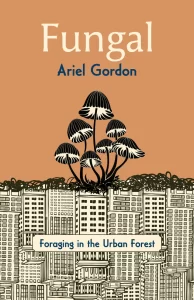By Michael Frey
Fungal: Foraging in the Urban Forest
by Ariel Gordon
Wolsak and Wynn (2024)
It’s all there in the subtitle, Foraging in the Urban Forest. In Ariel Gordon’s collection of essays, Fungal, we follow Gordon’s inquiry into the Urban Forest to gather that which feeds us and gifts us a grand metaphor for life, hers and by proxy our own.
We forage to feed, and Gordon provides us with the nutrition of her revealed compulsion whilst all the while tying herself, and her progress, to that of the oft ignored mycelium.
As we walk with Gordon, curiosity and fascination intertwine with personal moral development. She constructs a grand metaphor with fungi, mapping her own values onto this parallel existence with the third kingdom of fungi, neither plant nor animal, fungi exist between predictable lifeforms, able to weave and integrate with both. Like the fruiting bodies of fungi, mushrooms appear only under specific conditions, and as we read her bold and sometimes shockingly frank expositions we are fed by the foraging of her stories.
Fungal reveals itself to be a forage of fascination driving introspection, the basket being filled with the fruits of her time feeding her relentless curiosity. Her enthusiasm is not culinary, its fundamental and flows to the profound so that we lose our separation with her and with the fungi upon which this life is intertwined.
Her moral core reflects the fungal construction, her values are the developing interactive material from which the fruiting bodies of her experience emanate. The stories could easily drift into the pastoral or the passe of the “can you eat it?” crowd but there is far too much substance to be harvested and she delivers a full basket of character and awareness. Go ahead and try it, every mushroom is “edible once”.
As with all things fungi, there is a restlessness to her thinking which belies the continual growth/decay nexus of fungal fascination. Her prose is effortless and unguarded, revealing her ease of self, her awareness of both natural and social context. Social context runs throughout the collection, she exposes an unwilling to cast off her value core for the sake of external expectation, her awareness of the implications of these choices is direct and clear, neither triumphal nor bitter, it does not escape her when slights and exclusions are launched at her either directly or by cultural proxy.
Gordon deftly provides a summation of her moral core as simple as it is effective. “…things I believe in: a just society, and a planet that is healthy and balanced” (pg. 165). Like human, like fungi: life is an action, a verb. Both are in constant process of striving towards balance of forces, sometimes the nurturer and sometimes the nurtured, but never in isolation, part of a whole. You can’t forage online to learn about fungi and humans. You have to go out in the world, get your hands dirty and feast on the results.
Gordon avoids the obsessions of typology, biochemistry, and taxonomy in favor of a holistic relationship with fungi and the world, always able to stay in a state of engagement with fungi: strange, wonderful, threatening, nurturing, repairing, decomposing, feeding, healing and above all providing a central moral purpose for life.
The strongest piece in the collection is the well titled “Eating My Words”. Describing her co- conspirator’s experiment to grow edible fungi using the literal pages of her book as growth medium, Gordon delivers a full basket for her efforts. Dense and filled with a balanced enthusiasm for the joy of the perfect circle of life, for an author captivated by fungi, to have your own words become literal food, to be cycled into fodder for health, the words feed the mind, feed the soul, feed the fungi, feed the soil, and feed the author. Circle complete, bravo.
A fascination with the fungal is no prerequisite for this collection, merely a fascination with the
human.
Michael Frey is an entrepreneur, an intellectual jack of all trades, a renaissance man, and has studied with Paul Stamets where curiosity with mushrooms became an obsession.

